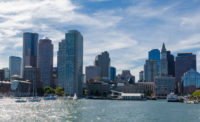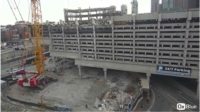A state court ruling could indefinitely delay a $1.2-billion waterfront tower that had appeared to be finally edging towards construction under former Boston Mayor Marty Walsh after years of delays.
The Massachusetts Supreme Judicial Court recently nixed Boston’s Downtown Municipal Harbor Plan. Approved under the Walsh administration, the harbor plan laid out zoning rules that would have effectively paved the way for developer Don Chiofaro to move forward with plans to replace an aging concrete parking garage next to the New England Aquarium with a 600-ft tower overlooking the city’s harbor.
However, in its decision, the state’s top court found that state officials erred in sending the Boston harbor development plan to the state’s energy and environmental affairs secretary for approval. Instead, state law requires the plan to be approved by the state Dept. of Environmental Protection.
The decision is likely to have a similar impact on plans to develop the nearby James Hook & Co. Lobster site into a 25-story tower, which was also covered under the city’s now-invalidated downtown waterfront zoning plan.
Mass DEP “has no authority to delegate to the Secretary its public trust duties to preserve and protect the public's interest in tidelands in this manner,” the court states in its decision.
Gov. Charlie Baker's (R) administration may be able to comply with the court ruling and give Mass DEP final sign off powers while also preventing a complete do-over of Boston’s downtown municipal harbor plan, said Tamara Small, chief executive of NAIOP Massachusetts.
“I don’t think they have to redo it,” Small said. “It would be a regulatory fix.”
Still, the harbor plan, and Chiofaro’s project in particular, were already facing obstacles prior to the court decision, with the administration of Boston Mayor Michelle Wu in February having kicked off the process of amending the plan.
In a press release, the Wu administration signaled it wants to “further refine resiliency guidelines and take into account additional public engagement.
“We have to get this right on the waterfront and truly plan for equitable access and climate resiliency in these critical areas of our city,” Wu said at the time in a statement.
Wu has also signaled she’s more interested in hammering out the zoning rules for the East Boston’s waterfront and promoting new development in traditionally disadvantaged neighborhoods than investing time and energy into downtown waterfront development.
The combination of the court ruling and the Wu administration’s stance means Chiofaro’s project could face years of additional regulatory reviews by both city and state officials before it will be in a position to win a green light to start construction.
Chiofaro first unveiled plans to tear down the aquarium garage a decade ago under now late Mayor Thomas M. Menino.
By altering who gets the final say on whether new waterfront development plans are approved, the Massachusetts Supreme Judicial Court’s decision could impact future waterfront projects across the city, as well as on waterfront development sites up and down the state’s coastline.
In a footnote, the decision also let stand 17 different harbor plans across the state that have been approved since the 1990s, saying the deadline for appeals had expired.
But NAIOP’s Small said that is not likely to be enough to reassure developers with new projects in already established and long-approved harbor plans.
“We really need to give some certainty to developers and landowners who have been in a weird limbo,” she said.





